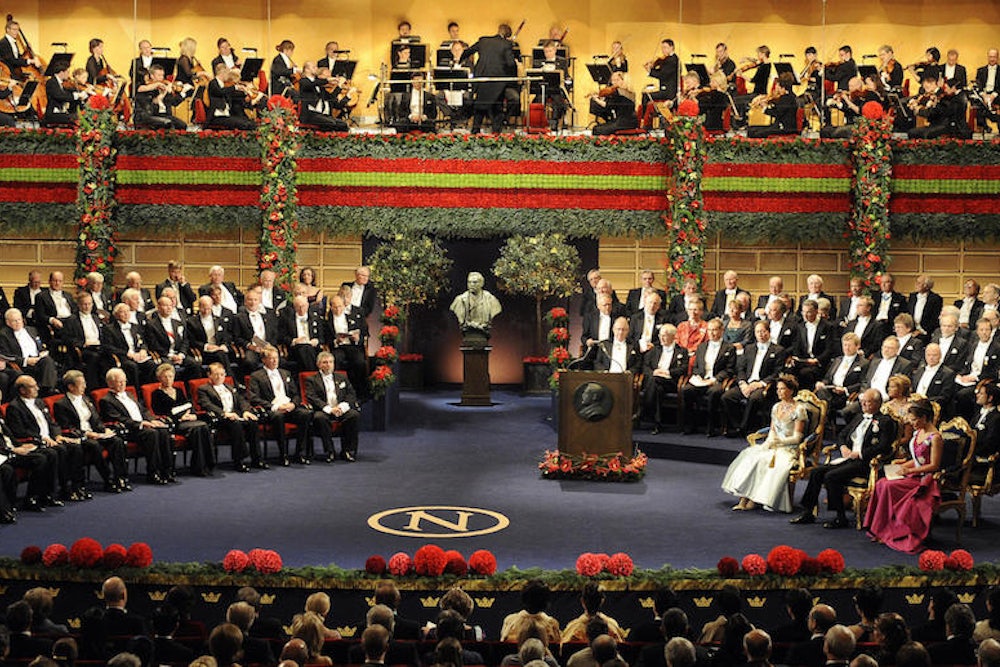Maybe it’s the season. (Polls! Polls! Polls!) But even in off-cycle political years, pre-award discussion often revolves around the supposed front-runner.
For a number of reasons, this is silly. Even among legitimate candidates, the odds-on favorite in the days before is rarely the actual winner, despite the attention paid to him or her. This year, Haruki Murukami was given the best odds. In 2011, the Syrian poet Adonis was the favorite; Tomas Tranströmer (ranked second) won. In 2008, when Jean Marie Gustave Le Clézio won, Adonis and Claudio Magris shared the top spot. Sometimes, the odds aren’t even close; in 2010, Tranströmer, Ngugi wa Thiong’o, and Haruki Murakami occupied the one-through-three slots. Mario Vargas Llosa, ranked 25th the night before, was the winner. (These rankings are all from the Ladbrokes at various points a day or so before the announcement.)
There are some exceptions. In 2006, Orhan Pamuk shared the number-one with Adonis, and won. In 2009, when Herta Müller won, the odds had her tied for the top slot with Amos Oz. And if, for instance, the betting shops gave the top-ranked writer a one in five chance of winning, and, over the years, the top-ranked writer won 20 percent of the time—then these odds aren’t all that bad.
Support thought-provoking, quality journalism. Join The New Republic for $3.99/month.
Most people, though, aren’t interested in this type of nuance—focusing instead on the top-ranking candidates. And in most cases in recent years, the front-runner has not taken home the prize. In addition to the 2011 and 2008 contests, this has been the pattern in 2007, 2005, and 2003. Adonis, especially, seems the always-a-bridesmaid candidate—he’s had top billing five times since 2003 but never bagged the 8 million kronor.
The attention we pay to these ranking is also silly when you consider the somewhat arbitrary way they come about. At Ladbrokes, a group of staffers attaches odds to about 50 writers to kick things off, based on some concept of who’s important in the literary world. (This is the same team that comes up with the odds for the Oscars and the U.S. elections, so it’s probably safe to say that they haven’t read all the contenders.) Over at Betsafe, they can perhaps claim a little more insight; the company was “started by Norwegians in 2006,” PR Manager Mikael Mellqvist told me, “so we have some good sources in the Nordic Region.” But he also admits that it’s not straightforward: “It is not like a soccer game where you know the teams’ strengths.”
Then there’s the influence of the market: the more people that place bets on a particular writer, the shorter the odds. The shorter the odds, the more favored the writer. But while such scenarios tend to be fairly accurate when it comes to political elections (Intrade is, more often than not, a fairly accurate predictor of electoral outcomes), there’s a limit to how far the literary wisdom-of-the crowds extends. For one thing, the number of participants is pretty small—making the odds highly susceptible to shifting whims. The numbers of people who place bets on the Nobel is in the thousands, with the typical bet ten or twenty pounds. (Ladbrokes takes in an amount in the tens of thousands of pounds from the Nobel contest; a Saturday afternoon Premiership League soccer match, by contrast, might bring in half a million pounds, says spokesman Alex Donohue.) This means that a few bets of large amounts or a sudden flurry can push one candidate ahead. That’s why, it seems, Bob Dylan’s enjoyed a rapid ascent in recent days. Customers can also get people onto the list by calling in bets—presumably this is how E.L. James arrived.
So, even if you kept tabs on the shifting odds and Googled every foreign name that cropped up in recent days, you still probably did not have a very good sense of the field. Inside the Academy is probably the only place you’re likely to find that intel. Too bad Adonis didn’t have an advocate in those halls.
Chloë Schama is Executive Editor of The Book. Sam Carter contributed reporting.
